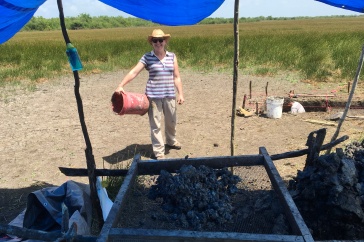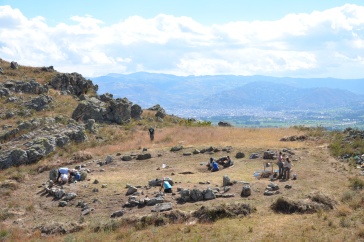
Only a dozen or so awards are given each year to graduating seniors who have made an extraordinary mark at UNH. Of those awards, one of the most prestigious is the Hood Achievement Prize, given to the man who shows the greatest promise through his character, scholarship, leadership and usefulness to humanity. Ross Conroy, a political science major from Berwick, Maine, is this year’s recipient of the Hood Prize. But Conroy isn’t on campus to accept his award. Instead, he’s in Rwanda and Uganda studying the path to peace. The College Letter contacted Conroy in Rwanda to congratulate him and ask about his experience in Africa.
The College Letter (TCL): What you are doing in Rwanda?
Ross Conroy (RC): I am on a study abroad program run by The School for International Training studying post-genocide and post-conflict restoration and peace building in Rwanda and Uganda.* I am also conducting an independent research study on big power politics during the 1994 genocide against the Tutsis. This research focuses on Opération Turquoise, which was the French-led United-Nations-sponsored mission to create a “safe zone” in southern and western Rwanda during the genocide. My research focuses on reconciling the two conflicting narratives of this mission. Namely that one side (primarily France) emphasizes the humanitarian contributions of the mission, while the other side (mainly Rwanda) emphasizes that Opération Turquoise was a neocolonial power grab and an attempt for France to back up the genocidal regime that was historically closely aligned with France. The conclusions of this research should be fascinating. Finally, after the completion of this program in May, I will be doing an internship until July. I have not yet determined exactly where, but at the moment it looks like it will be either with the U.S. Embassy, a U.N. agency or the Rwandan National Commission for the Fight Against Genocide.
*Conroy’s research is funded by a Boren Scholarship, an initiative of the National Security Education Program that supports U.S. undergraduate students studying less commonly taught languages in countries critical to the security and stability of the United States. Students apply for Boren Scholarships through the UNH Office of National Fellowships.

Ross Conroy '16 meets the king's royal cattle while visiting the traditional Rwandan king's palace.
TCL: What made you want to go to Rwanda?
RC: I have been fascinated by the conflict in Rwanda for a long time. Ultimately, one of the deciding factors was that I would be able to study not only in Rwanda but in Uganda as well, which gave me the opportunity to study firsthand two conflicts. The focus on reconstruction and peace building made the program a perfect fit for my interests. Otherwise, I have long been interested in Rwanda’s incredibly fast development since the genocide and wanted to see how this was accomplished and if the model would be applicable in other contexts. So far I have been very pleased with the curriculum and everything I have been studying. It has certainty lived up to my expectations.
TCL: You have spent time in Namibia, Senegal and Cameroon. What is your connection to Africa?
RC: It would be unfair to answer this question without giving credit to my father, Dr. Drew Conroy, a professor of animal science at the Thompson School at UNH. He did his Ph.D. research in Tanzania when I was growing up, so from a very young age I felt a connection to Africa. My first experience in Africa was also because of him, when he went to teach in Namibia on a Fulbright award. I have to be honest here in saying that I was not enthused about the idea of going to Africa for a year and leaving everything I knew behind. In fact if you ask him, he'll tell you how he dragged me kicking a screaming all the way there. However, that turned out to be a life-changing moment for me. I realized how much I loved it there and since then have craved new experiences in new cultures and new contexts. That spurred my decision to return to Africa many times. In Senegal I studied culture and literature, in Cameroon I worked at the U.S. Embassy and conducted research, and now I am here in Rwanda and Uganda. I expect that once I leave, I'll be back again very soon.
TCL: Can you tell us a little bit about what you’re learning?
RC: I don't think I can speak highly enough about experiential learning, and that is exactly what I'm doing here. There is no way that I could learn in depth about Rwanda and Uganda's histories without being here talking to people who have been involved in politics, development, peace building and so many other fields. I have had the pleasure of speaking with a member of parliament, a presidential advisor, the founder of the Rwandan stock exchange, many different NGOs and a plethora of other incredible people. It has been a pleasure to learn from them. In addition, I have been studying the local language, Kinyarwanda, which is entirely new to me. It has made assimilating into and understanding the culture a lot easier.
TCL: What has been the most surprising thing you’ve encountered?
RC: The participation in and view of governance in Rwanda. People participate to a degree unheard of in the U.S. I'm talking about 98-99% turnout rates in elections and an intense interest in domestic politics across the board, at all levels. In addition, I have been slightly surprised by the degree to which people agree with the government and its actions. To be sure, President Kagame has done an incredible job, but there seems to be a cult of personality evolving around him with no space for dissenting opinions. Although I expected this from what I read before arriving, I think the degree to which this is true has certainly surprised me.
TCL: If you could bring other UNH students to Rwanda to visit for a day, where would you want to take them and what would you want to show them?
RC: I'll have to preface this by saying that one day isn't nearly enough, but I'll do my best! I think it's important for people to meet and interact with local people, as they can often give the best sense of where they are from, so I would first make sure that was possible. Sharing a traditional Rwandan meal would be one of the best ways to do this. Secondly, for people who may not entirely understand Rwanda's history, a visit to the Gisozi Genocide Memorial and museum can be an extremely moving and educational experience. Finally, Rwanda has an affordable and organized bus system that can be used to access most of the country, and I think it would be a good way to see Rwanda from a local perspective.
TCL: What is the one thing you would want your fellow Americans to know about Rwanda if you were given a national platform on which to speak?
RC: I would say that Rwanda is so much more than the legacy left by the genocide. Undoubtedly, that is an unforgettable part of history that shaped Rwanda today, but now, 22 years out, Rwanda is so much more. I think Americans still think about the genocide when they think of Rwanda, and wonder about the safety and development of the country. However, today Rwanda is one of the safest and most developed countries in Sub Saharan Africa. It's important to remember this history but realize that Rwanda is so much more.
TCL: What do you do for fun when you have free time?
RC: The Rwandan people are extremely friendly and open, and this has made it very easy to make friends who have shown me much of the country that I would not have seen otherwise. In addition to this, I love football (soccer) and much of my free time is spent playing soccer, watching soccer on TV with friends and even attending some games at the national stadium. These have been some of my favorite experiences, especially as people here have a passion for football that is not often found back in the U.S.
TCL: What will be your next steps when return to the U.S.?
RC: Next stop is grad school! I have heard back from all of the schools I have applied to and am making decision within the next week or two. My top two choices right now are Stanford University and the University of Edinburgh. My master’s will be in African studies and will help prepare me for a policy career with the U.S. government, as I have already committed to working with them after graduation from my master’s program as part of the Boren Scholarship I received to study here in Rwanda.
TCL: Thank you, Ross, and congratulations on your award. The College of Liberal Arts is proud of you!
-
Written By:
Susan Dumais '88 '02G | College of Liberal Arts

















































